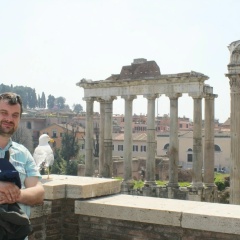Итак, на форуме Кудрина - творца налоговой системы, по которой Москва высасывает все ресурсы из остальной России, возглавляющий столицу господин Собянин открыто и ничего не стесняясь заявил, что сельские жители - лишние люди (ср. с лишенцами 1920-30-х гг.), что всех граждан страны надо запихать в крупные агломерации типа Москвы, где, как было сказано на том же форуме, живут и работают 35 миллионов человек - четверть населения страны. Кроме оскорбительного характера слов оторвавшегося от реальности столичного губернатора, следует отметить, что это - апофеоз, кульминация той разрушительной региональной и административно-территориальной политики, которая выбрана в качестве превалирующей в последние 2 десятилетия. Искусственное собирание всего ресурса в одном крупнейшем и нескольких крупных центрах противоречит истории колонизации России, разрушает государственную ткань и традиционный народный уклад, создает массу новых, ненужных угроз для нашего общества. Понимают ли это творцы "реформы"? Думаю, что да, не стоить быть наивными.
Сохранение России и приумножение ее людей и культуры кроются совсем в другом варианте развития - поддержке сетевой структуры мелких населенных пунктов, обустройстве исторических малых городов, строительстве новых, современных малых городов и интеллектуальных центров (и не типа татарстанского Иннополиса, опять-таки вписанного в агломерацию, а разных, привязанных к природному ресурсу и путям сообщения), связывании их качественной современной инфраструктурой, эффективных экономических мерах по ограничению перенаселения крупных городов и сверхвысотного строительства и точечной застройки в них. Именно в этом будущее России - страны, "которая колонизуется" (В. О. Ключевский). Концепция же Кудрина-Собянина и прочей российской бюрократической клептократии - это путь страны в пропасть, к ее будущему разделению и частичному поглощению такими мощными экономическими державами, как Китайская народная республика. И если кто-то себя чувствует патриотом России, то этот бред господ в дорогих импортных костюмах поддержать никак не может. Не может, на мой взгляд, поддержать этот нонсенс и наша Русская Православная Церковь. Святейшим Патриархом Кириллом начата 6 лет назад и к настоящему моменту в основном завершена совершенно правильная и полезная для страны (а отнюдь не только для Церкви) реформа - дробление епархий. Если эта реформа в ближайшие годы перейдет от необходимой декларативности и повседневно-прагматических плюсов для высшего церковного управления к структурообразующим и стратегическим процессам (а это, на мой взгляд, возможно, но возможно лишь при определенном дистанцировании церковной власти на местах от бюрократической клептократии и, напротив, при сближении с паствой в духе решений Собора 1917-18 гг.), то это будет прорыв и великое дело, которое будет сделано Церковью - дело, заведомо расширяющее социальную базу Церкви как общественного института и заставляющее забыть о всех имиджевых провалах последних лет. Буду рад, если важнейшая тема нашего бытия была бы затронута на предстоящем Архиерейском соборе или хотя бы на следующем. Как эксперт я не первый год разрабатываю (к сожалению, пока в стол) эти вопросы и готовы выступить с таким экспертным докладом перед владыками. Жаль, если эта тема пройдет мимо органа высшего церковного управления.
Сохранение России и приумножение ее людей и культуры кроются совсем в другом варианте развития - поддержке сетевой структуры мелких населенных пунктов, обустройстве исторических малых городов, строительстве новых, современных малых городов и интеллектуальных центров (и не типа татарстанского Иннополиса, опять-таки вписанного в агломерацию, а разных, привязанных к природному ресурсу и путям сообщения), связывании их качественной современной инфраструктурой, эффективных экономических мерах по ограничению перенаселения крупных городов и сверхвысотного строительства и точечной застройки в них. Именно в этом будущее России - страны, "которая колонизуется" (В. О. Ключевский). Концепция же Кудрина-Собянина и прочей российской бюрократической клептократии - это путь страны в пропасть, к ее будущему разделению и частичному поглощению такими мощными экономическими державами, как Китайская народная республика. И если кто-то себя чувствует патриотом России, то этот бред господ в дорогих импортных костюмах поддержать никак не может. Не может, на мой взгляд, поддержать этот нонсенс и наша Русская Православная Церковь. Святейшим Патриархом Кириллом начата 6 лет назад и к настоящему моменту в основном завершена совершенно правильная и полезная для страны (а отнюдь не только для Церкви) реформа - дробление епархий. Если эта реформа в ближайшие годы перейдет от необходимой декларативности и повседневно-прагматических плюсов для высшего церковного управления к структурообразующим и стратегическим процессам (а это, на мой взгляд, возможно, но возможно лишь при определенном дистанцировании церковной власти на местах от бюрократической клептократии и, напротив, при сближении с паствой в духе решений Собора 1917-18 гг.), то это будет прорыв и великое дело, которое будет сделано Церковью - дело, заведомо расширяющее социальную базу Церкви как общественного института и заставляющее забыть о всех имиджевых провалах последних лет. Буду рад, если важнейшая тема нашего бытия была бы затронута на предстоящем Архиерейском соборе или хотя бы на следующем. Как эксперт я не первый год разрабатываю (к сожалению, пока в стол) эти вопросы и готовы выступить с таким экспертным докладом перед владыками. Жаль, если эта тема пройдет мимо органа высшего церковного управления.
So, at the forum of Kudrin, the creator of the tax system, according to which Moscow sucks out all the resources from the rest of Russia, Mr. Sobyanin, the head of the capital, openly and without hesitation said that the villagers are superfluous people (cf. the deprived people of the 1920s and 1930s) that all citizens of the country should be crammed into large agglomerations such as Moscow, where, as was said at the same forum, 35 million people live and work - a quarter of the country's population. In addition to the insulting nature of the words of the capital’s governor, who has lost touch with reality, it should be noted that this is an apotheosis, the culmination of that destructive regional and administrative-territorial policy, which was chosen as prevailing in the last 2 decades. Artificial collection of the entire resource in one of the largest and several major centers contradicts the history of the colonization of Russia, destroys the state fabric and traditional national order, creates a host of new, unnecessary threats to our society. Do creators of “reform” understand this? I think that yes, you should not be naive.
The preservation of Russia and the increase of its people and culture lie in a completely different development option - supporting the network structure of small settlements, arranging historical small towns, building new, modern small cities and intellectual centers (and not like the Tatarstan Innopolis, again inscribed in the agglomeration, but different, tied to the natural resource and means of communication), linking them with high-quality modern infrastructure, effective economic measures to limit the overpopulation of large cities and super-high-rise construction and point building in them. It is in this that the future of Russia is a country “which is being colonized” (V.O. The concept of Kudrin-Sobyanin and other Russian bureaucratic kleptocracy is the country's path to the abyss, to its future division and partial absorption by such powerful economic powers as the People’s Republic of China. And if someone feels that he is a patriot of Russia, then this nonsense of gentlemen in expensive imported suits cannot support in any way. In my opinion, this nonsense cannot be supported by our Russian Orthodox Church either. His Holiness Patriarch Kirill started 6 years ago and by the present moment, the reform, which is absolutely correct and useful for the country (and by no means only for the Church), has been basically completed - the fragmentation of dioceses. If this reform in the coming years moves from the necessary declarative and everyday-pragmatic advantages for higher church administration to structure-forming and strategic processes (and this, in my opinion, is possible, but possible only with a certain distance of church authority on the ground from bureaucratic kleptocracy and, on the contrary , with rapprochement with the flock in the spirit of the decisions of the Council of 1917-18), it will be a breakthrough and a great work to be done by the Church - a work that deliberately expands the social base of the Church as a public and tute and make you forget about all of image failures of recent years. I would be glad if the most important topic of our being would be touched upon at the upcoming Council of Bishops or at least at the next one. As an expert, I have been developing these questions (unfortunately, so far at the table) for several years and are ready to make such an expert report to the masters. It is a pity if this topic passes by the authority of the highest church administration.
The preservation of Russia and the increase of its people and culture lie in a completely different development option - supporting the network structure of small settlements, arranging historical small towns, building new, modern small cities and intellectual centers (and not like the Tatarstan Innopolis, again inscribed in the agglomeration, but different, tied to the natural resource and means of communication), linking them with high-quality modern infrastructure, effective economic measures to limit the overpopulation of large cities and super-high-rise construction and point building in them. It is in this that the future of Russia is a country “which is being colonized” (V.O. The concept of Kudrin-Sobyanin and other Russian bureaucratic kleptocracy is the country's path to the abyss, to its future division and partial absorption by such powerful economic powers as the People’s Republic of China. And if someone feels that he is a patriot of Russia, then this nonsense of gentlemen in expensive imported suits cannot support in any way. In my opinion, this nonsense cannot be supported by our Russian Orthodox Church either. His Holiness Patriarch Kirill started 6 years ago and by the present moment, the reform, which is absolutely correct and useful for the country (and by no means only for the Church), has been basically completed - the fragmentation of dioceses. If this reform in the coming years moves from the necessary declarative and everyday-pragmatic advantages for higher church administration to structure-forming and strategic processes (and this, in my opinion, is possible, but possible only with a certain distance of church authority on the ground from bureaucratic kleptocracy and, on the contrary , with rapprochement with the flock in the spirit of the decisions of the Council of 1917-18), it will be a breakthrough and a great work to be done by the Church - a work that deliberately expands the social base of the Church as a public and tute and make you forget about all of image failures of recent years. I would be glad if the most important topic of our being would be touched upon at the upcoming Council of Bishops or at least at the next one. As an expert, I have been developing these questions (unfortunately, so far at the table) for several years and are ready to make such an expert report to the masters. It is a pity if this topic passes by the authority of the highest church administration.
У записи 47 лайков,
11 репостов,
1815 просмотров.
11 репостов,
1815 просмотров.
Эту запись оставил(а) на своей стене Александр Мраморнов

































































